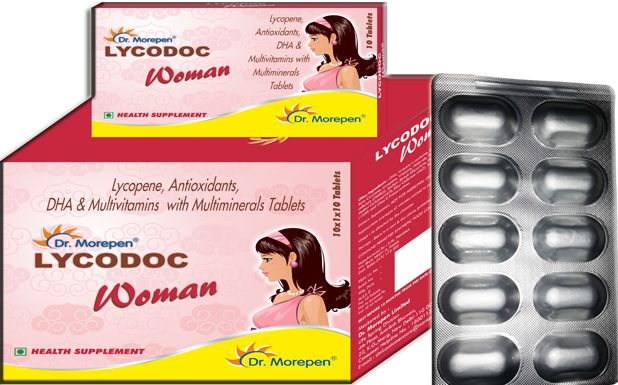Health Benefits:
● Energy production
● Management of healthy skin, hair and nails
● Used in cardiovascular diseases
● Pernicious anemia
● Used in kidney stones
● Strengthens the immune system
● Regulates blood pressure
● Production of red blood cells
● Regulates carbohydrate metabolism
● For rheumatoid arthritis and osteoarthritis
● Used in neurodegenerative diseases
● Age- related macular disease ( eye disease)
● Used in diabetes
● Used in Hepatitis C
● Used in pregnancy
● Antioxidant activity
● For digestion
● Used for common cold
● Minimize digestive complaints
● Treat hormone-related infertility problems
Antioxidants:
Lycopene:
Lycopene; a member of carotenoid family; is a lipid soluble antioxidant synthesized by many plants and microorganisms. Lycopene is a red, fat-soluble pigment classified as a carotenoid, found in many fruits and vegetables. Lycopene is produced by organisms to protect against oxidative damage from oxygen and light. The health benefits of lycopene are attributed to its potent antioxidant nature.
Beta-Carotene:
Beta-carotene is one of a group of red, orange, and yellow pigments called carotenoids. Beta-carotene and other carotenoids provide approximately 50% of the vitamin A needed in the diet. Beta-carotene can be found in fruits, vegetables, and whole grains.
Docosahexaenoic Acid:
Docosahexaenoic acid (DHA) is an omega-3 fatty acid that is a primary structural component of the human brain, cerebral cortex, skin, sperm, testicles and retina. It can be synthesized from alpha-linolenic acid or obtained directly from maternal milk or fish oil.
Cysteine: Sulfur Containing Amino Acid ( N-Acetyl-L- Cysteine):
N-Acetyl-L-cysteine (sometimes written N-Acetyl-L- cysteine), is a metabolite of cysteine, a non-essential amino acid that is both found in foods and synthesized by the body from the amino acid methionine.
Multiminerals:
Zinc As (Zinc Ascorbate):
Zinc is an essential trace mineral. Every cell in the body needs this nutrient and hundreds of body processes rely on it, from the immune system and the enzymes that produce DNA to the senses of taste and smell.
Manganese:
Manganese is a mineral and trace element that plays many essential roles in the body. It helps to activate enzymes needed for use of biotin, B-1 (thiamin) and vitamin C. It is important for the formation of thyroxine, the main hormone of the thyroid gland. Manganese is essential for proper digestion, normal bone structure and normal functioning of the central nervous system.
Chromium:
Chromium is a mineral our bodies use in small amounts for normal body functions, such as digesting food. Chromium exists in many natural foods including brewer's yeast, meats, potatoes (especially the skins), cheeses, molasses, spices, whole-grain breads and cereals, and fresh fruits and vegetables.
Selenium:
Selenium is an antioxidant that is present in every human cell, and it's essential for the maintenance of a healthy body. This naturally-occurring substance is mostly found in the liver, kidney, testes, pancreas and spleen. It helps to limit the activities of free radicals, which can be harmful to the body. Selenium promotes the release of an enzyme called glutathione peroxidise, which can eliminate peroxides that destroy essential lipids.
Natural Extract:
Pine Bark Extract:
Pine bark extract is extracted from the inner bark of certain European pine trees. Although all pine bark extracts contains the powerful antioxidants oligomeric proanthocyanidin compounds.
Multivitamins:
B Vitamins: B-1, B-2, B-9, B-12, B-6 & Biotin:
Vitamin B complex includes a bunch of water soluble vitamins that share common characteristics and hence grouped under one name. All B vitamins are extremely, important and considered essential micronutrients that must be obtained to ensure optimal health and well- being. Vitamin B complex can be consumed in moderate concentration via diet and nutritional supplements with minimal risk of toxicity since excessive doses are excreted in urine.
Vitamin D3:
Vitamin D refers to a group of fat-soluble secosteroids responsible for enhancing intestinal absorption of calcium, iron, magnesium, phosphate and zinc. In humans, the most important compounds in this group are vitamin D3 (also known as cholecalciferol) and vitamin D2 (ergocalciferol). Cholecalciferol and ergocalciferol can be ingested from the diet and from supplements. The body can also synthesize vitamin D (specifically cholecalciferol) in the skin, from cholesterol, when sun exposure is adequate (hence its nickname, the "sunshine vitamin").
